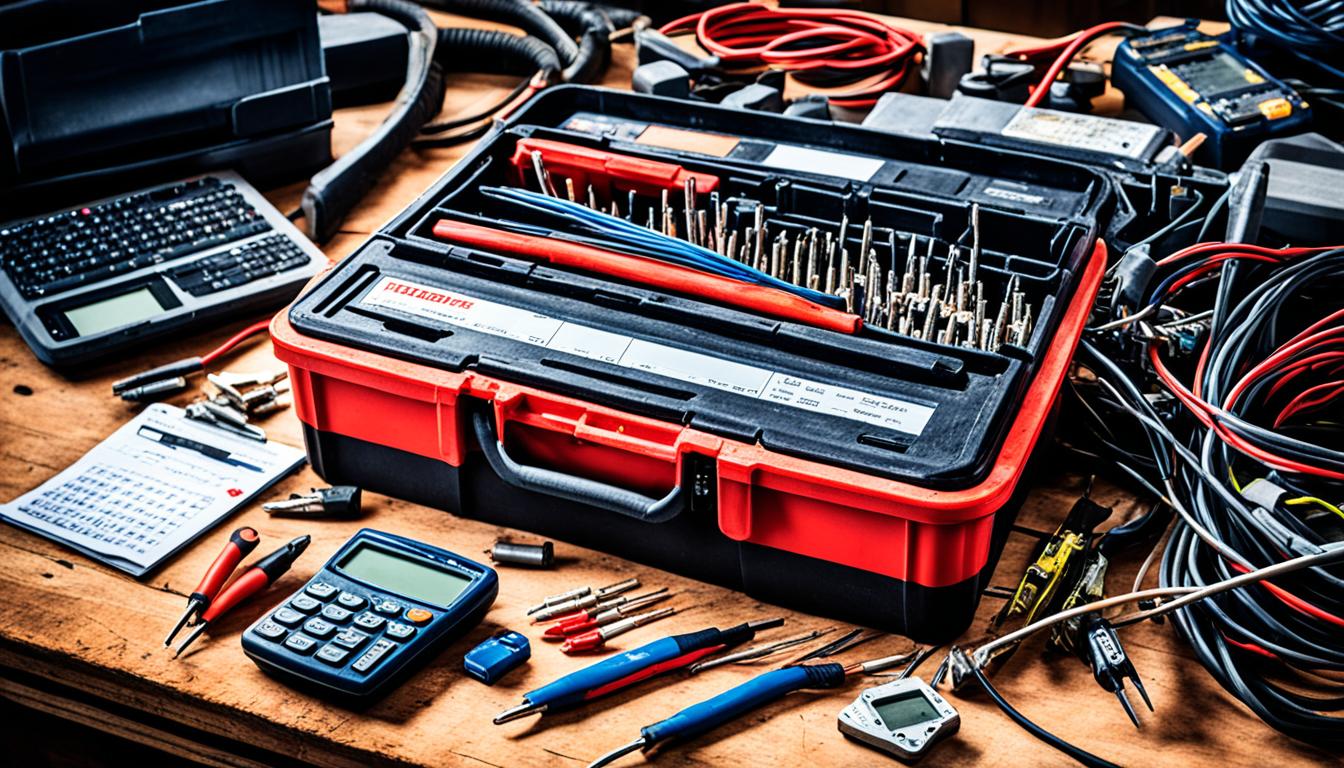According to our sources, electricians in the UK earn the highest average salary among most trades. The average hourly rate for self-employed electricians is around £40, with some charging over £40 per hour. Emergency hourly rates for electricians range from £80-100. For larger projects that take a day or more, an average daily rate of £200-250 is common. Pricing for electrical jobs can also depend on factors such as location, materials, and the type of job. It is important to keep in mind that the hourly or daily rate is just one aspect of the cost, as additional expenses like travel, materials, and taxes need to be taken into account.
Self Employed Electrician Hourly Rate UK
Self employed electrician hourly rate uk can vary depending on several factors, but understanding the average rates and additional costs involved is crucial for anyone considering hiring an electrician. In this guide, we will explore the factors that can affect the cost of hiring a self-employed electrician in the UK, provide tips for hiring the right professional, and emphasize the importance of hiring a qualified electrician for your electrical needs.
Factors Affecting Electrician Costs in the UK
When it comes to hiring a self-employed electrician in the UK, there are several factors that can influence the overall cost. It’s important to consider these factors to ensure you get an accurate quote and understand the pricing structure.
Type of Job
The nature of the electrical job can have a significant impact on the rates charged by electricians. Different tasks, such as installation, repair, or maintenance, may require varying levels of expertise and time commitment. Therefore, the hourly rate for an electrician can vary depending on the complexity of the job.
Independent vs. Subcontractor
The employment status of the electrician can also affect the rates. Independent electricians who work for themselves may have different hourly rates compared to subcontractors who are hired by larger electrical companies. The hourly rate for independent electricians may reflect their operational costs and the level of experience they bring to the job.
Location
The location of the project can impact the cost of hiring an electrician. Areas with higher living expenses may result in higher hourly rates. It’s important to consider the regional variations in electrician rates when planning your budget.
Job Complexity and Materials
The complexity and size of the job, as well as the materials required, can also influence the overall cost. Projects that involve intricate installations or require specialized equipment may incur a higher hourly rate. Additionally, the cost of materials needed for the job should be factored into the overall pricing.
By considering these factors and discussing them with the electrician, you can ensure transparency and get an accurate quote for your electrical project.

| Location | Average Hourly Rate (£) |
|---|---|
| London | £45-£60 |
| Manchester | £35-£50 |
| Birmingham | £30-£45 |
Tips for Hiring a Self-Employed Electrician in the UK
When it comes to hiring a self-employed electrician in the UK, it’s essential to choose someone who is reliable, skilled, and offers competitive rates. Here are some tips to help you find the right electrician for your needs:
1. Obtain Multiple Quotes
Before making a decision, get quotes from different electricians to compare their prices and services. This will give you a better understanding of the average hourly rate and ensure you’re getting a fair deal for the work you need.
2. Request a Detailed Breakdown of Costs
Ask each electrician for a breakdown of the costs involved, including any additional fees or charges. This will help you determine if there are any hidden costs and allow you to make an informed decision based on your budget.
3. Check for Price Lists and Day Rates
Some electricians may offer a price list or a day rate for larger projects. This can be advantageous as it provides transparency and allows you to plan your budget accordingly. Inquire if they have a set price for specific electrical tasks.
4. Read Customer Reviews and Testimonials
To gauge the reputation and reliability of an electrician, read customer reviews and testimonials. This will give you insights into their previous work and the experiences of other clients. A high number of positive reviews is a good indication of their quality of service.
5. Ask for References and Proof of Qualifications
Don’t hesitate to ask for references from past clients and proof of qualifications from the electrician. This will help you verify their expertise and ensure you’re hiring a qualified professional.
6. Discuss Specific Job Details
Clearly communicate the specific details of your job, such as the number of sockets or fixtures needed. This will enable the electrician to provide an accurate estimate based on the scope of work required.
Remember, finding the right self-employed electrician is important for the safety and success of your electrical project. By following these tips and conducting thorough research, you can hire an electrician who not only offers competitive rates but also delivers quality workmanship.

Choosing the right self-employed electrician doesn’t have to be daunting. With the right approach and careful consideration, you can find an electrician who meets your needs and delivers excellent results.
Understanding the Value of Hiring a Qualified Electrician
Hiring a qualified and experienced electrician is essential for ensuring the safety and efficiency of electrical work. While the hourly rate for a self-employed electrician may seem high, it is important to understand the value that comes with their expertise. Qualified electricians have undergone extensive training and have the knowledge and skills to handle electrical installations, repairs, and maintenance. Hiring a professional reduces the risk of electrical faults, which can lead to potential hazards, such as fires or electrical shocks. It is worth investing in a qualified electrician to ensure the job is done correctly and to maintain the safety of your home or business.
Electricity is a powerful force that can be dangerous if not handled properly. Attempting to cut costs by hiring an unqualified or inexperienced electrician can result in costly mistakes and compromise the safety of your property. A qualified electrician has the necessary training and experience to carry out electrical work in compliance with industry standards and regulations. They understand the potential risks involved and know how to mitigate them effectively.
It is important to remember that electrical work is not something to be taken lightly. The consequences of DIY electrical work or hiring an unqualified electrician can be severe, including electrical fires, electrical shock, or even loss of life. Hiring a qualified electrician ensures that the job is done safely and professionally, giving you peace of mind and protecting you, your family, and your property.
Another benefit of hiring a qualified electrician is their ability to offer valuable advice and recommendations. They can assess your electrical needs, recommend suitable solutions, and suggest energy-efficient alternatives. This expertise can help you make informed decisions when it comes to electrical installations, upgrades, or repairs, ultimately saving you money in the long run.
Hiring a Qualified Electrician: Key Points
- Ensure the electrician is fully qualified and licensed
- Ask for references or look for reviews and testimonials to gauge their reputation
- Verify their insurance coverage to protect yourself in case of any accidents or damages
- Discuss the scope of the project and ask for a detailed breakdown of costs
- Consider their experience in handling similar electrical projects
- Communicate your needs clearly and ask for recommendations, if necessary
By hiring a qualified electrician, you can have the confidence that your electrical work is being carried out by a professional with the necessary expertise and knowledge. Their skills and attention to detail will ensure that the job is completed safely and efficiently, providing you with peace of mind and a reliable electrical system.

As the image above highlights, hiring a qualified electrician is crucial for ensuring the safety and reliability of your electrical system. It is worth considering the long-term benefits and peace of mind that come with hiring a professional.
Conclusion
Hiring a self-employed electrician in the UK can involve various factors and considerations. Understanding the average hourly rates, factors that affect costs, and tips for hiring can help you make an informed decision. Remember to consider the expertise and qualifications of the electrician, as well as the specific requirements of your project.
By doing thorough research and obtaining multiple quotes, you can find a self-employed electrician who offers both competitive pricing and quality workmanship. Prioritize safety and quality when selecting an electrician, and don’t hesitate to ask for references or proof of qualifications. The value of hiring a qualified electrician goes beyond the hourly rate, ensuring the safety and efficiency of your electrical installations and repairs.
So, if you’re looking for a self-employed electrician in the UK, take your time to find the right one. Consider the factors that affect costs, compare quotes, and prioritize the expertise and qualifications of the electrician. By doing so, you can ensure that your electrical projects are completed to the highest standard, providing you with peace of mind and a safe electrical system.
FAQ
What is the average wage for a self employed electrician?
The average hourly rate for a self-employed electrician in the UK ranges from £30 to £50 per hour. However, rates can vary depending on location, level of experience, and the complexity of the job. Some electricians also charge a day rate, which can be between £200 to £300 per day.
How much is the self-employed electrician day rate in UK?
The day rate for a self-employed electrician in the UK typically ranges from £180 to £300 per day. This rate can vary based on factors such as location, experience, and the specific services being provided.
Can electricians make 6 figures UK?
Yes, it is possible for electricians to earn six figures in the UK, especially if they have many years of experience, specialized skills, and run their own successful business. Electricians who work on complex projects, offer premium services, or work in high-demand areas can command higher rates, which can contribute to a six-figure income.
What qualifications need to be a self-employed electrician?
To be a self-employed electrician in the UK, you need to obtain a Level 3 NVQ or SVQ in Electrical Installation and pass the 18th Edition Wiring Regulations exam. Additionally, you must hold valid Public Liability Insurance and be registered with a competent persons scheme such as NICEIC or ELECSA.




